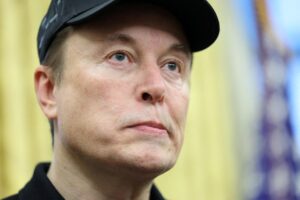Elon Musk’s Legal Battle with OpenAI: A Complex Tangle of Interests in AI Innovation
In a recent turn of events in the legal world, Elon Musk faced a setback in his quest to halt the transformation of OpenAI, the company he co-founded, from a nonprofit organization to a for-profit entity backed by Microsoft (MSFT). Yet, amidst this defeat, Musk seems to have gained a significant legal foothold, with a federal court agreeing to expedite proceedings relating to his core grievances against OpenAI.
Court Ruling Overview
Judge Yvonne Gonzalez Rogers, presiding over the case in a California federal district court, denied Musk’s immediate request for an injunction against OpenAI’s plans. However, she acknowledged the legitimacy of Musk’s concerns by offering to fast-track the trial, potentially setting it for the fall of 2025. This suggests that the court recognizes the profound public interest and potential harm involved in OpenAI’s shift to a profit-driven model.
Musk’s legal actions seek to prevent OpenAI—under the leadership of co-founder Sam Altman—and Microsoft from proceeding with their plans, which include transferring substantial material assets and intellectual property. Musk contends that his original $45 million donation to OpenAI was predicated on its commitment to maintaining its nonprofit status.
Musk vs. Altman: The Original Partnership and Disagreements
Musk and Altman initially founded OpenAI in 2015 with a vision to develop artificial intelligence safely and ethically. However, their partnership became strained over fundamental disagreements regarding the future of AI and the operational direction of OpenAI. As a result, Musk has stepped away to form his own AI venture, xAI, which now competes directly with OpenAI.
Interestingly, Altman alleges that Musk desired to merge OpenAI into Tesla, perhaps as a means of securing additional funding for AI projects. Such a merger could have transformed the landscape of both companies’ operations, and Musk’s assertion that Altman breached conditions tied to his donation complicates matters further.
Legal Ramifications of the For-Profit Shift
Musk’s lawsuit stems not just from concerns about business practices but also raises questions about ethical data usage and competitive fairness. His accusations extend to the presence of interlocking directors between OpenAI and Microsoft, claiming that this could jeopardize sensitive information and give rise to unfair competition practices.
Throughout the proceedings, Gonzalez Rogers has expressed skepticism regarding the claims made by both parties. She noted that while Musk’s allegations merit serious consideration, there is a fine line between competitive transparency and conflict of interest, particularly with the amount of capital being funneled into AI innovation. Recently, Microsoft has invested a staggering $13.75 billion into OpenAI, further intensifying the competition in this rapidly evolving industry.
Future Implications for AI and Investors
The implications of this lawsuit extend beyond Musk and OpenAI. If Musk’s claims are validated, it could redefine how nonprofit AI entities operate in a highly competitive landscape. Furthermore, this case could establish significant legal precedents concerning funding conditions and corporate governance in the tech sector.
As an investor or stakeholder in the technology and AI fields, it’s essential to keep an eye on developments in this case. The resolution will influence not only the investment climate surrounding AI but also the ethical frameworks that govern how artificial intelligence is developed and integrated into our lives.
With the trial expected to unfold in the coming years, we at Extreme Investor Network will continue to provide our readers with in-depth analyses and updates on the financial implications of these unfolding legal battles. Leveraging our industry insights, we aim to equip you with the knowledge needed to navigate the complexities of investing in a domain where innovation and legal frameworks are at a constant intersection.
Stay tuned for more as we unpack the intricacies of this legal clash and its broader impact on the future of AI.

